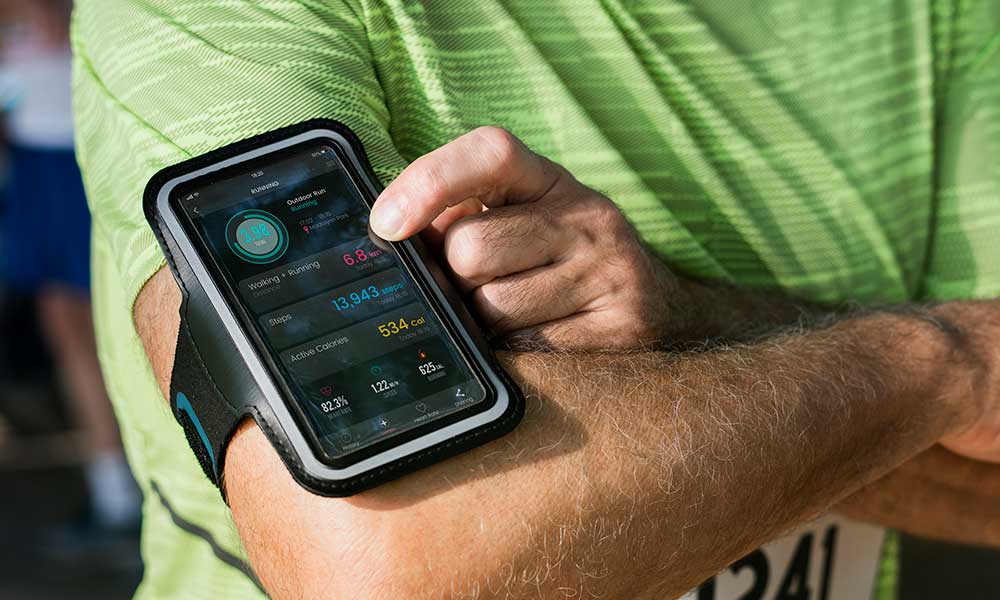Introduction
Digital fitness trackers are becoming increasingly popular amongst fitness enthusiasts and those looking to improve their overall health and wellbeing.
They promise to track your every move, help you set realistic fitness goals, and even offer real-time feedback on your diet and exercise regimens. The idea is that these digital devices can deliver accurate feedback on your physical activity levels, minute-by-minute calorie expenditure, and sleep quality.
But how accurate are these digital devices in reality? In this article, we’ll examine the evidence surrounding the accuracy of fitness trackers. We’ll look at whether they can provide genuine insights into your physical activity levels or if they’re just a gimmick. We’ll also explore the potential disadvantages of using them and how to get the most out of them.

Overview of Digital Fitness Trackers
Over the past few decades, the field of wearable fitness technology has established itself as a surprisingly powerful tool for those seeking to better understand and optimize their workouts. According to market analysis, wearable fitness technology is expected to dominate the market in the coming years, with names like Garmin becoming increasingly prominent in both professional and amateur sports.
In fact, given that fitness tracking devices and technology have developed so rapidly since the 1960s, it can be difficult to keep up with all the new advancements, particularly when it comes to accuracy. Therefore, in this article we will take a look at the current evidence regarding digital fitness trackers and their reliability in measuring physical activity.
Overall, understanding digital fitness trackers is an important step for any fitness enthusiast. With rapidly advancing technologies promising improved tracking accuracy, it’s important to stay up-to-date on the latest developments in order to make informed decisions about which tools are best for you.
Advantages and Disadvantages of Using Fitness Trackers
With the rise of digital tracking technology, fitness trackers are becoming increasingly popular among trainers and gym-goers alike. While they can be useful in monitoring exercise performance, there are both advantages and disadvantages to consider when it comes to investing in a fitness tracker.
Firstly, fitness trackers are typically expensive to buy, making them an expensive investment for those on a budget. Additionally, many trackers have limited battery life that require frequent charging which can be annoying.
The accuracy of fitness trackers has also been questioned in numerous studies—whether they measure steps taken, heart rate or caloric intake—as these metrics often vary depending on the individual’s health and lifestyle. Other potential issues include lack of accuracy in tracking sleep patterns and not being suitable for everyone when it comes to using the device itself.

How Accurate Are Fitness Trackers? Examining the Evidence
The accuracy of fitness trackers is an oft-debated topic, with some studies suggesting that mainstream devices can reliably measure heart rate, steps, distance and sleep duration. In fact, a study conducted by the Journal of Personalized Medicine found that the Fitbit Charge and Charge HR have good accuracy for step counts, while the Apple Watch was considered to be accurate for estimating energy consumption.
On the other hand, research has found that fitness trackers are up to 40.1% inaccurate for accurately measuring energy expenditure – although this still may be better than relying solely on self-reported estimations of activity level. Even though there remains debate over how dependable the readings from a fitness tracker are, it nonetheless provides an objective view into one’s daily activity level and how this impacts overall health – making it a useful tool for health tracking.
Evaluating the Best Budget Fitness Trackers
As with any product, when it comes to fitness trackers, you get what you pay for. But that doesn’t mean that the cheaper models don’t provide useful features – there are several budget-friendly options on the market that have plenty of value.
The Fitbit Inspire 3 is the best overall budget fitness tracker in 2023, providing users with a pedometer, heart rate monitor and sleep tracking capabilities. It also features a long battery life and offers a variety of activities to choose from.
For those looking for an even more affordable option, the Xiaomi Mi Smart Band 6 is their best bet – it costs just $50 and tracks steps, heart rate, sleep quality and blood oxygen levels. However, its battery life is significantly shorter than the Fitbit Inspire 3’s.
Finally, if you’re willing to spend a little more for something with higher-tech capabilities, then consider the Garmin Venu 2 ($200), which offers GPS tracking, pulse oximeters and onboard music storage.
Exploring the Latest Innovations in Fitness Technology
The latest innovations in fitness technology are exploring more accurate real-time monitoring of physical activity, using a variety of sensors and other forms of wearable technology. Fitness trackers come in many shapes and forms, ranging from those that can measure heart rate, steps taken and calories burned to sophisticated devices that can monitor sleep patterns, activity levels and even stress levels.
More advanced fitness trackers are now being released with advances such as 3D motion analysis sensors, AI personal trainers and virtual trainer apps. These digital tools provide users with a comprehensive view of their fitness data and give them access to personalized instruction from an AI personal trainer. With these tools, users can also create customized goals for nutrition plans and track daily progress towards these goals.
For example, a user could set themselves the goal to burn 100 calories every day or to reduce their intake by 500 calories per week. Fitness trackers can capture this data over time, allowing users to visualize their progress with the help of detailed charts and graphs.
Ultimately, these technological advancements offer users greater insights into their physical activity while providing more accurate data tracking capabilities than ever before. This is leading to more meaningful feedback on individual performance over time, allowing people to tailor their regimen more precisely in order to achieve their desired results.

Integrating a Fitness Tracker Into Your Daily Routine
Fitness trackers have become increasingly popular in recent years, with many people now relying on their tracking devices to stick to their daily fitness goals. Integrating a fitness tracker into your daily routine can provide many benefits, including:
Keeping Track of Your Movement
A fitness tracker can measure daily activity such as standing, movement, and exercise throughout the day. This is especially useful for people who work in sedentary environments. A tracker can reward you for even an hour of movement a day, helping you form positive habits for the long-term.
Measuring Metrics
Various apps and trackers measure metrics such as sleep, steps, calories burned and heart rate. This allows you to measure and monitor your progress over time and develop a better understanding of how activity levels impact your overall health.
Designing Workout Plans
With a fitness tracker, you can identify patterns in your activity and create tailored workout plans or calendars that suit your individual needs. You will also be provided with suggestions depending on what type of workout you are doing, such as yoga or running.
Conclusion
In conclusion, while fitness trackers can be useful tools to help track exercise and physical activity, they may not be as accurate as we’d like them to be. It is important to understand their strengths and weaknesses, so that the data they track can be interpreted properly and used responsibly. Different models of fitness trackers may have different levels of accuracy, so it may be helpful to compare reviews and ratings before deciding which one to purchase. Ultimately, if you are looking for reliable, accurate data about your fitness progress, it is important to also consider other methods, such as manually keeping track of your activity or using a more precise activity-tracking device.






























